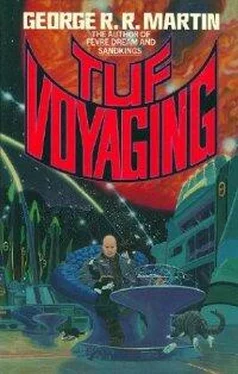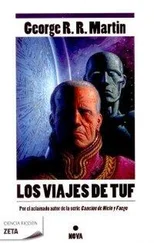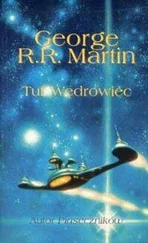“We have animals,” the host protested. “Out in the agrifactory zones. Plenty of animals—I’ve seen tapes.”
“No doubt you have,” said Tuf. “A tape of a cat and a cat, however, are somewhat different things, and require different treatment. Tapes can be stored on a shelf. Cats cannot.” He pointed at the host. “These are in the nature of quibbles, however. The crux of the matter, as I have previously mentioned, lies more in the number of S’uthlamese than in their manner. There are too many people, sir. I have been jostled repeatedly on every occasion. In eating establishments, the tables are too close to other tables, the chairs are insufficient to my size, and strangers sometimes seat themselves beside me and pummel me with rude elbows. The seats in theaters and sensoriums are cramped and narrow. The sidewalks are crowded, the lobbies are crowded, the tubes are crowded—there are people everywhere who touch me without my leave or consent.”
The host slipped into a polished professional smile. “Ah, humanity!” he said, waxing eloquent. “The glory of S’uthlam! The teeming masses, the sea of faces, the endless pageant, the drama of life! Is there anything quite as invigorating as rubbing shoulders with our fellow man?”
“Perhaps not,” said Haviland Tuf flatly. “Yet I find I am now sufficiently invigorated. Furthermore, permit me to point out that the average S’uthlamese is too short to rub against my shoulders, and has therefore been forced to content him- or herself with rubbing up against my arms, legs, and stomach.”
The host’s smile faded. “You are taking the wrong attitude, sir. To fully appreciate our world, you must learn to see it through S’uthlamese eyes.”
“I am unwilling to go about on my knees,” said Haviland Tuf.
“You’re not anti-life, are you?”
“Indeed not,” said Haviland Tuf. “Life is infinitely preferable to its alternative. However, in my experience, all good things can be carried to extremes. This would seem to be the case on S’uthlam.” He raised a hand for silence before the host could respond. “More particularly,” Tuf continued, “I have developed something of an antipathy, no doubt overhasty and unjustified, to some of the individual specimens of life I have come upon during chance encounters in my travels. A few have even expressed open hostility to me, directing at me epithets clearly derogatory of my size and mass.”
“Well,” said the host, flushing, “I’m sorry, but you are, uh, ample, and on S’uthlam it is, uh, socially unacceptable to be, uh, overweight.”
“Weight, sir, is entirely a function of gravity, and is therefore most malleable. Moreover, I am unwilling to concede you the authority to judge my weight over, under, or just right, these being subjective criteria. Aesthetics vary from world to world, as do genotypes and hereditary predisposition. I am quite satisfied with my present mass, sir. To return to the matter at hand, I wish to terminate my stay immediately.”
“Very well,” said the host. “I will book passage for you on the first tubetrain tomorrow morning.”
“This is unsatisfactory. I would prefer to leave at once. I have examined the schedules and discovered a listing for a train in three standard hours.”
“Full,” snapped the host. “Nothing left on that one but second- and third-class seating.”
“I shall endure as best I can,” said Haviland Tuf. “No doubt the close press of so much humanity will leave me much invigorated and improved when I depart my train.”
Tolly Mune floated in the middle of her office in a lotus position, looking down on Haviland Tuf.
She kept a special chair for flies and groundworms who were unaccustomed to weightlessness. It was a rather uncomfortable chair, all things considered, but it was bolted securely to the deck and equipped with a web-harness to keep its occupant in place. Tuf had pushed over to it with awkward dignity and strapped himself down tightly, and she had settled in comfortably in front of him, at about the level of his head. A man the size of Tuf could not possibly be accustomed to having to look up at anyone during conversation; Tolly Mune figured it gave her a certain psychological edge.
“Portmaster Mune,” Tuf said, appearing remarkably unfazed by his inferior position, “I must protest. I comprehend that these repeated references to my own person as a fly are merely an instance of colorful local slang with no opprobrium attached. Still, I cannot but take a certain umbrage at this obvious attempt to, shall we say, pull my wings off.”
Tolly Mune grinned down at him. “Sorry, Tuf,” she said. “Our price is firm.”
“Indeed,” said Haviland Tuf. “Firm. An interesting word. Were I not awed to be in the mere presence of such an esteemed personage as yourself, and uneasy about giving offense, I might go so far as to suggest that this firmness approaches rigidity. Politeness forebears me from mouthing any statements about greed, avarice, and deep-space piracy in order to further my end of these thorny negotiations. I will point out however, that the sum of fifty million standards is several times greater than the gross planetary product of a good number of worlds.”
“Small worlds,” said Tolly Mune, “and this is a large job. You’ve got one hell of a big ship there.”
Tuf remained impassive. “I concede that the Ark is indeed a large ship, but fear this has little bearing on matters, unless it is customary for you to charge by the square meter rather than by the hour.”
Tolly Mune laughed. “This isn’t like fitting some old freighter with a few new pulse-rings or reprogramming your drive navigator. You’re talking thousands of hours even with three full crews of spinnerets on triple-shift, you’re talking massive systems work by the best cyber-techs we’ve got, you’re talking manufacture of custom parts that haven’t been used in hundreds of years, and that’s just for starts. We’ll have to research this damn museum piece of yours before we start ripping it apart, or we’ll never be able to get it back together. We’ll have to lure some planetside specialists up the elevator, maybe even go out of system. Think of the time, the energy, the calories. The docking fees alone—That thing is thirty kilometers long , Tuf. You can’t get her into the web. We’ll have to build a special dock around her, and even then she’ll take up the berths we could have used for three hundred ordinary ships. You don’t want to know what it would cost, Tuf.” She did some quick figuring on her wrist computer, and shook her head. “If you’re here one local month, a real optimistic projection, that’s nearly a million cals in docking fees alone. More than three hundred thousand standards in your money.”
“Indeed,” said Haviland Tuf.
Tolly Mune spread her hands helplessly. “If you don’t like our price, you could, of course, take your business elsewhere.”
“This suggestion is impractical.” said Haviland Tuf. “Unfortunately, as simple as my requests are, it appears that only a handful of worlds possess the expertise to fulfill my requirements—a sad commentary on the present state of human technological prowess.”
“Only a handful?” Tolly Mune raised a corner of her mouth. “Perhaps we have priced our services too low.”
“Madam,” said Haviland Tuf. “Surely you would not be so crass as to take advantage of my naive frankness.”
“No,” she said. “As I said, our price is firm.”
“It appears we have reached an embarrassing and knotty impasse. You have your price. I, unfortunately, do not.”
“I never would have guessed. A ship like yours, I would have figured you to have calories to burn.”
“No doubt I shall soon pursue a lucrative career in the field of ecological engineering,” said Haviland Tuf. “Unfortunately, I have not yet commenced my practice, and in my previous trade I had recently suffered some unaccountable financial reverses. Perhaps you would be interested in some excellent plastic reproductions of Cooglish orgy-masks? They make unusual and stimulating wall decorations, and are also said to have certain mystic aphrodisiac properties.”
Читать дальше












